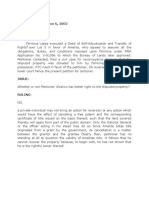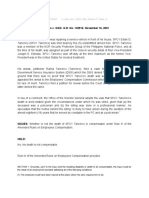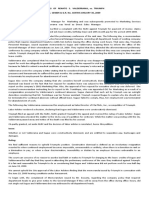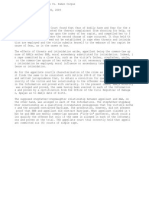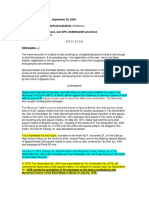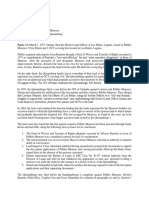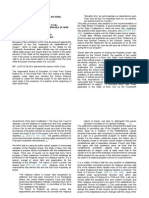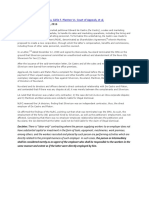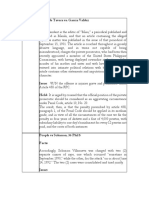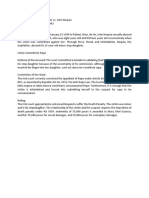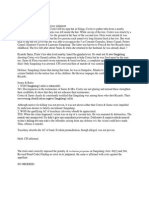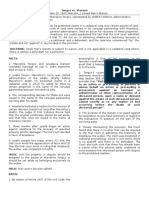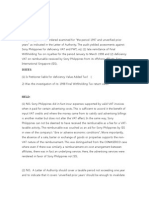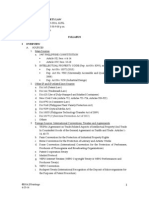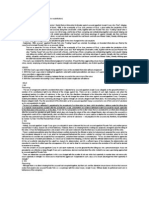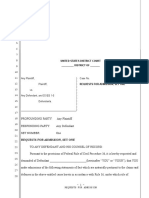Choa Vs People
Choa Vs People
Uploaded by
Mar Jan GuyCopyright:
Available Formats
Choa Vs People
Choa Vs People
Uploaded by
Mar Jan GuyOriginal Description:
Original Title
Copyright
Available Formats
Share this document
Did you find this document useful?
Is this content inappropriate?
Copyright:
Available Formats
Choa Vs People
Choa Vs People
Uploaded by
Mar Jan GuyCopyright:
Available Formats
Choa Vs people.
Leni choa
Facts:
1.Alfonso Chan Choa, petitioner, is a Chinese national. On April 25, 1989, he filed with the Regional Trial Court (RTC), Branch
41, Bacolod City, a verified petition for naturalization,[
2. During the initial hearing of the case on August 27, 1990, petitioner testified on direct examination but he was not able to
finish the same. On August 29, 1990, he filed a motion to withdraw his petition for naturalization.[2] The trial court granted the
motion in its Resolution dated September 28, 1990,[3] which partly reads:
"The petitioner, Alfonso Chan Choa, has not yet finished testifying on direct-examination. Although the petitioner has not stated in
his said 'Motion To Withdraw Petition' the reason why he is withdrawing his petition at this stage of the proceedings, the petitioner can
not be compelled to continue with his petition for naturalization.
"In view thereof, the petitioner, Alfonso Chan Choa, is allowed to withdraw his petition for naturalization.
3. Meanwhile, on August 5, 1992, State Prosecutor Pedro D. Delfin on detail at Bacolod City, acting upon the complaint of petitioner's
wife, Leni, filed an Information[4] with the Municipal Trial Court in Cities (MTCC), Branch 3, Bacolod City, charging petitioner with
perjury under Article 183 of the Revised Penal Code, docketed as Criminal Case No. 50322. The Information reads:
4..) I am married to a Filipino. My wife's name is Leni Ong Choa and now resides at 46 Malaspina Street, Bacolod City. I have two (2)
children whose names, dates and places of birth, and residence are as follows:
10) I am of good moral character, I believe in the principles underlying the Philippine Constitution. I have conducted myself in a
proper and irreproachable manner during the entire period of my residence in the Philippines in my relations with the constituted
government as well as with the community in which I am living.'
x x x x x x x x x
when in truth and in fact, said accused knew that his wife Leni Ong Choa and their two (2) children were not then residing at
said address at # 46 Malaspina Street, Villamonte, Bacolod City, having left the aforesaid residence in 1984, or about five (5)
years earlier and were then residing at Hervias Subdivision, Bacolod City; that contrary to his aforesaid allegation in his
verified Petition for Naturalization, accused, while residing at 211 106 Street, Greenplains Subdivision, Bacolod City, has been
carrying on an immoral and illicit relationship with one Stella Flores Saludar, a woman not his wife since 1984, and begetting
two (2) children with her as a consequence, as he and his wife, the private offended party herein, have long been separated from bed
and board since 1984; which falsehoods and/or immoral and improper conduct are grounds for disqualification to become a citizen of
the Philippines.
6)petitioner entered a plea of not guilty. Trial ensued thereafter.
After trial, the MTCC rendered a Decision[6] finding petitioner guilty of perjury, as charged, thus:
7.)Petitioner filed a motion for a reconsideration,[7] contending, among others, that there is no basis to convict him of perjury
because almost two years prior to the filing of the Information, his motion to withdraw the petition for naturalization containing the
alleged false statements was granted by the MTCC, hence, the alleged false statements were no longer existing or had become functus
officio.
8.)denied petitioner's motion for reconsideration.
9.)appeal, the Regional Trial Court (RTC), Petitioner then filed with the Court of Appeals a petition for review, docketed as CA-G.R. CR
No. 19968. In his comment, the Solicitor General recommended the acquittal of petitioner, contending that the withdrawal of his petition
for naturalization rendered the same functus officio, thus making the questioned false statements inexistent.
10)The Court of Appeals, in its Decision dated June 8, 1999,[10] affirmed the RTC Decision with modification, thus:
" In convicting petitioner, the Appellate Court adopted as its own the RTC's findings as follows:
"Evidence presented clearly proved that all the above-enumerated elements (of perjury) have been duly executed by the accused.
His allegations in his petition regarding his, his wife's and children's residences and his positive averment of the fact that he
is of good moral character and had conducted himself in an irreproachable manner during his stay in the Philippines are
material matters in connection with his petition for naturalization as they are essential facts required by Sec. 7 of C.A. No. 473
for one to fulfill for the acquisition of Philippine citizenship. They are the very facts which would be the subject of inquiry by
the court hearing the petition and the same would be the basis of the court's ruling whether one is qualified and granted
Philippine citizenship.
The information shows that the statement was duly subscribed and sworn to before Notary Public Felomino B. Tan, Jr., a
person competent and authorized by law to receive and administer oath and the same was entered in his notary register as Doc. No.
"That the accused made a willful and deliberate assertion of falsehood could be gleaned from the discrepancies in his given
addresses. In his petition for naturalization he gave No. 46 Malaspina Street, Villamonte, Bacolod City as his and his wife's
residence, while in the birth certificates and the affidavit of admission of paternity of both Fonsella Kae Saludar and Steve
Albert Saludar, he gave No. 211, 106 Street, Greenplains Subdivision, Bacolod City as his address besides from the fact that while
may have been residing in the above-stated addresses, his wife and children have been staying at Hervias Subdivision, Bacolod City
since the latter part of 1984. Furthermore, cohabiting openly with another woman not his wife and siring (2) children with the same, in
open defiance with the norm of morality of the community where monogamy is the accepted practice, is very inconsistent with his
allegations of a moral life, proper and irreproachable, considering that the accused, by his own admission is a graduate of the
University of St. La Salle, a school known for its high academic and moral standards. These assertions are not only willful and
deliberate but a perversion of truth which the law is mandated to punish.
Petitioner filed a motion for reconsideration but it was denied by the Court of Appeals
the present petition for review on certiorari.[13]
ISSUE: whether petitioner may be convicted of perjury based on the alleged false statements he stated in his petition for naturalization
withdrawn almost two years prior to the filing of the Information for perjury
Held:
Both the petitioner and the Solicitor General in their respective pleadings contend that the challenged Decision of the Court of Appeals
should be reversed because: (a) not all the elements of the crime of perjury are present; and (b) the withdrawal of the petition for
naturalization which contains the alleged untruthful statements bars the prosecution of petitioner for perjury.
The petition is unmeritorious.
Article 183 of the Revised Penal Code under which petitioner has been charged and convicted, provides:
"Art. 183. False testimony in other cases and perjury in solemn affirmation. - The penalty of arresto mayor in its maximum period to
prision correccional in its minimum period shall be imposed upon any person who, knowingly making untruthful statements and not
being included in the provisions of the next preceding articles, shall testify under oath, or make an affidavit, upon any material matter
before a competent person authorized to administer an oath in cases in which the law so requires.
"Any person who, in case of a solemn affirmation made in lieu of an oath, shall commit any of the falsehoods mentioned in thi s and the
three preceding articles of this section, shall suffer the respective penalties provided therein."
The elements of perjury are:
1. The accused made a statement under oath or executed an affidavit upon a material matter;
2. The statement or affidavit was made before a competent officer authorized to receive and administer oath;
3. In that statement or affidavit, the accused made a willful and deliberate assertion of a falsehood; and
4. The sworn statement or affidavit containing the falsity is required by law or made for a legal purpose.[14]
All these elements are present in the instant case. Petitioner willfully and deliberately alleged false statements concerning his
"residence" and "moral character" in his petition for naturalization. This was sufficiently proven by the prosecution, as
succinctly noted by the Court of Appeals in its assailed Decision.
The petition for naturalization was duly subscribed and sworn to by petitioner before Notary Public Filomino B. Tan, Jr., a person
competent and authorized by law to receive and administer oath. Also, petitioner started testifying under oath on his false
allegations before the trial court.
The allegations in the petition regarding "residence" and "moral character" are material matters because they are among the very
facts in issue or the main facts which are the subject of inquiry[15] and are the bases for the determination of petitioner's
qualifications and fitness as a naturalized Filipino citizen. Thus, C.A. No. 473 provides:
"SEC. 2. Qualifications. - Subject to section four of this Act, any person having the following qualifications may become a citizen of the
Philippines by naturalization:
x x x x x x x x x
"Third. He must be of good moral character and believes in the principles underlying the Philippine Constitution, and must have
conducted himself in a proper and irreproachable manner during the entire period of his residence in the Philippines in his relation with
the constituted government as well as with the community in which he is living;
The necessity of declaring a truthful and specific information on the "residence" and "moral character" in the petition for naturalization
has been underscored by this Court in Chua Kian Lai vs. Republic,[16] thus:
"One qualification for Philippine citizenship is that the petitioner 'must be of good moral character.' That circumstance should be
specifically alleged in the petition.
We cannot go along with the submission of the petitioner and the Solicitor General that petitioner could no longer be
prosecuted for perjury in view of the withdrawal of the petition for naturalization containing his false material statements. In
this jurisdiction, it is not necessary that the proceeding in which the perjury is alleged to have been committed be first terminated
before a prosecution for the said crime is commenced.[18] At the time he filed his petition for naturalization, he had committed
perjury. As discussed earlier, all the elements of the crime were already present then. He knew all along that he wilfully stated
material falsities in his verified petition. Surprisingly, he withdrew his petition without even stating any reason therefor.[19] But such
withdrawal only terminated the proceedings for naturalization. It did not extinguish his culpability for perjury he already committed.
Indeed, the fact of withdrawal alone cannot bar the State from prosecuting petitioner, an alien, who made a mockery not only
of the Philippine naturalization law but the judicial proceedings as well. And the petition for naturalization tainted with material
falsities can be used as evidence of his unlawful act.
communication rule since the false statements he made in his petition for naturalization has instead made a mockery of the
administration of justice.
The Flordelis case is likewise not in point. There, Flordelis was charged with perjury for having alleged false statements in his verified
answer. This Court held that no perjury could be committed by Flordelis because "an answer to a complaint in an ordinary civi l action
need not be under oath," thus, "it is at once apparent that one element of the crime of perjury is absent x x x, namely, that the sworn
statement complained of must be required by law."[24]
WHEREFORE, the instant petition for review on certiorari is hereby DENIED. The appealed Decision of the Court of Appeals is
AFFIRMED.
You might also like
- Dr. Gobenciong v. CADocument24 pagesDr. Gobenciong v. CAPaolo OrtizNo ratings yet
- Davao Light V CA and AdarnaDocument3 pagesDavao Light V CA and AdarnaCharisse Christianne Yu CabanlitNo ratings yet
- People vs. Lovedioro 250 SCRA 389Document16 pagesPeople vs. Lovedioro 250 SCRA 389Maricar VelascoNo ratings yet
- Alvarico vs. Sola G.R. No. 138953. June 6, 2002Document7 pagesAlvarico vs. Sola G.R. No. 138953. June 6, 2002Derek C. EgallaNo ratings yet
- Sps. Guanio V. Makati Shangri-La Hotel GR No. 190601, February 7 2011 FactsDocument14 pagesSps. Guanio V. Makati Shangri-La Hotel GR No. 190601, February 7 2011 FactsAnonymous UzSUnkNo ratings yet
- Medina v. Orozco, GR 26723, 1966Document4 pagesMedina v. Orozco, GR 26723, 1966Christia Sandee SuanNo ratings yet
- SPL Case DigestDocument24 pagesSPL Case Digestdlo dphroNo ratings yet
- 20.1 Natl Federation of Labor V NLRCDocument1 page20.1 Natl Federation of Labor V NLRCluigimanzanaresNo ratings yet
- Guerrero. Case No.26 29Document4 pagesGuerrero. Case No.26 29SALMAN JOHAYRNo ratings yet
- Baltazar LacaoDocument1 pageBaltazar LacaoGrey Gap TVNo ratings yet
- Umil V Ramos 1Document4 pagesUmil V Ramos 1Chino SisonNo ratings yet
- People Vs LapazDocument1 pagePeople Vs LapazryuseiNo ratings yet
- Tancinco v. GSIS. G.R. No. 132916. November 16, 2001 FactsDocument2 pagesTancinco v. GSIS. G.R. No. 132916. November 16, 2001 FactsJoshuaMaulaNo ratings yet
- Crim 1 Digests MC FinalsDocument10 pagesCrim 1 Digests MC FinalsMoonNo ratings yet
- People vs. Deunida DigestDocument1 pagePeople vs. Deunida DigestNicole FaustinoNo ratings yet
- 4 Sugue Vs TriumphDocument2 pages4 Sugue Vs TriumphRheymar OngNo ratings yet
- US V CapilloDocument1 pageUS V CapilloZora IdealeNo ratings yet
- People V CorpuzDocument1 pagePeople V CorpuzOlek Dela CruzNo ratings yet
- Miranda v. Tuliao, G.R. No. 158763, March 31, 2006Document3 pagesMiranda v. Tuliao, G.R. No. 158763, March 31, 2006Greta Fe DumallayNo ratings yet
- Dadizon v. CADocument8 pagesDadizon v. CAheyoooNo ratings yet
- 12 People v. EstibalDocument2 pages12 People v. EstibalKaye HazelNo ratings yet
- People V MagunddatuDocument1 pagePeople V MagunddatuLotsee ElauriaNo ratings yet
- Legal Ethics Case DigestsDocument5 pagesLegal Ethics Case DigestsCourtney TirolNo ratings yet
- Lingnam Restaurant V STEPDocument4 pagesLingnam Restaurant V STEPShairaNo ratings yet
- PP V Del SocorroDocument2 pagesPP V Del SocorroCandelaria QuezonNo ratings yet
- Cabigas v. PeopleDocument4 pagesCabigas v. PeopleresjudicataNo ratings yet
- Crim 2 Cases TreasonDocument107 pagesCrim 2 Cases TreasonKareen BaucanNo ratings yet
- ENGEL v. VITALEDocument6 pagesENGEL v. VITALEAdan_S1No ratings yet
- People V SopeDocument1 pagePeople V SopeMaria AIthea MicIat TevesNo ratings yet
- People vs. Abdul MacalabaDocument1 pagePeople vs. Abdul MacalabaConnie BebNo ratings yet
- Milo vs. SalangaDocument4 pagesMilo vs. SalangaEarl NuydaNo ratings yet
- Letran Calamba Faculty and EmployeesDocument2 pagesLetran Calamba Faculty and EmployeesGrace Ann TamboonNo ratings yet
- Yabut and GeorgeDocument6 pagesYabut and Georgebam112190No ratings yet
- Planton Vs CA 2016Document1 pagePlanton Vs CA 2016Karl Marxcuz ReyesNo ratings yet
- People Vs Francisco, 45 Phil 819Document2 pagesPeople Vs Francisco, 45 Phil 819Divina Gracia HinloNo ratings yet
- LOPEZ Vs PeopleDocument5 pagesLOPEZ Vs PeopleAnonymous oDPxEkdNo ratings yet
- Manalo Case Ladnmar Case For DivorceDocument15 pagesManalo Case Ladnmar Case For DivorceMyrnaJoyPajoJaposNo ratings yet
- T3 6 P vs. Rodriguez, 107 P 569Document1 pageT3 6 P vs. Rodriguez, 107 P 569Li MarNo ratings yet
- Title of The Case Facts Issue Held Rules 1-5Document7 pagesTitle of The Case Facts Issue Held Rules 1-5Chin MartinzNo ratings yet
- Case Digests Criminal Law 1Document50 pagesCase Digests Criminal Law 1Fulgue JoelNo ratings yet
- US v. Vergara 3 Phil 432Document1 pageUS v. Vergara 3 Phil 432Val SanchezNo ratings yet
- NequiaDocument1 pageNequiaShane Irish Pagulayan LagguiNo ratings yet
- AGBAY VsDocument2 pagesAGBAY VsCharlie ThesecondNo ratings yet
- Crim Digests Sept 6 COMPILEDDocument22 pagesCrim Digests Sept 6 COMPILEDRyan MalitNo ratings yet
- People vs. DiuDocument1 pagePeople vs. DiuMrln VloriaNo ratings yet
- People Vs Gallo and People Vs BeranaDocument2 pagesPeople Vs Gallo and People Vs BeranaJohn Patrick GarciaNo ratings yet
- 15 - Tongco vs. VianzonDocument1 page15 - Tongco vs. VianzonRuth LumibaoNo ratings yet
- People vs. Allingag DigestDocument2 pagesPeople vs. Allingag DigestEmir MendozaNo ratings yet
- @magdamo vs. Pahimulin, Am No. 662-mj, September 30, 1976Document5 pages@magdamo vs. Pahimulin, Am No. 662-mj, September 30, 1976James OcampoNo ratings yet
- Borovsky Vs Commissioner of Immigration Gr. No. L-4362 (1951) Full TextDocument4 pagesBorovsky Vs Commissioner of Immigration Gr. No. L-4362 (1951) Full TextKinitDelfinCelestialNo ratings yet
- Enrile vs. SalazarDocument1 pageEnrile vs. SalazarNanz JermaeNo ratings yet
- People Vs AvendanoDocument2 pagesPeople Vs AvendanoMNo ratings yet
- CrimDocument4 pagesCrimljhNo ratings yet
- People Vs BalatazoDocument7 pagesPeople Vs BalatazoEj AquinoNo ratings yet
- De Jonge v. Oregon: Assembly and Petition For Redress To Grievances The Purpose TestDocument1 pageDe Jonge v. Oregon: Assembly and Petition For Redress To Grievances The Purpose TestMa Gabriellen Quijada-TabuñagNo ratings yet
- Torres Vs Gonzales (1987)Document2 pagesTorres Vs Gonzales (1987)Ton RiveraNo ratings yet
- 1073 PEOPLE v. PAROJINOG (Salvador, A.) PDFDocument1 page1073 PEOPLE v. PAROJINOG (Salvador, A.) PDFAntonio SalvadorNo ratings yet
- 100 Enriquez Vs People, G.R. No. 119239. May 9, 2000Document9 pages100 Enriquez Vs People, G.R. No. 119239. May 9, 2000Perry YapNo ratings yet
- People vs. DasigDocument13 pagesPeople vs. DasigChristopher Julian ArellanoNo ratings yet
- Choa Vs People PDFDocument6 pagesChoa Vs People PDFstrgrlNo ratings yet
- Evidence, F) Conduct and Character Case People Vs NardoDocument2 pagesEvidence, F) Conduct and Character Case People Vs NardoMar Jan Guy50% (2)
- Na Yige Shi Shen Me NeDocument1 pageNa Yige Shi Shen Me NeMar Jan GuyNo ratings yet
- Wee Vs TankianseeDocument4 pagesWee Vs TankianseeMar Jan GuyNo ratings yet
- PCIB Vs BalmacedaDocument4 pagesPCIB Vs BalmacedaMar Jan GuyNo ratings yet
- PEZA Taxation Policy and IncentivesDocument2 pagesPEZA Taxation Policy and IncentivesMar Jan GuyNo ratings yet
- CIR Vs SonyDocument2 pagesCIR Vs SonyMar Jan GuyNo ratings yet
- Malabanan Vs RepublicDocument17 pagesMalabanan Vs RepublicMar Jan GuyNo ratings yet
- Saavedra Vs DojDocument2 pagesSaavedra Vs DojMar Jan Guy100% (1)
- Corporatation Law Doctrines UPDATEDDocument32 pagesCorporatation Law Doctrines UPDATEDMar Jan GuyNo ratings yet
- People Vs SalanguitDocument3 pagesPeople Vs SalanguitMar Jan GuyNo ratings yet
- Masangkay Vs People Case DigestDocument5 pagesMasangkay Vs People Case DigestMar Jan GuyNo ratings yet
- Ticman Notes 3Document3 pagesTicman Notes 3Mar Jan GuyNo ratings yet
- IP Law SyllabusDocument7 pagesIP Law SyllabusAnne Meagen ManingasNo ratings yet
- Francisco Vs CA Prescription DigestDocument2 pagesFrancisco Vs CA Prescription DigestMar Jan GuyNo ratings yet
- People Vs UybucoDocument3 pagesPeople Vs UybucoMar Jan GuyNo ratings yet
- People Vs CaseyDocument2 pagesPeople Vs CaseyMar Jan GuyNo ratings yet
- Teksystems Inc. v. Hammernik 10-CV-00819 (PJS-SRN) (D. Minn. Oct. 18, 2010 (Order For Permanent Injunction)Document8 pagesTeksystems Inc. v. Hammernik 10-CV-00819 (PJS-SRN) (D. Minn. Oct. 18, 2010 (Order For Permanent Injunction)Venkat BalasubramaniNo ratings yet
- Landmark Case On RTIDocument5 pagesLandmark Case On RTIAkanksha PandeyNo ratings yet
- Garcia v. RecioDocument6 pagesGarcia v. RecioEileen Kay A. MañiboNo ratings yet
- Baby Brianna Andrew WaltersDocument14 pagesBaby Brianna Andrew WaltersBaby Brianna50% (2)
- Thomasites Center For International StudiesDocument9 pagesThomasites Center For International StudiesJonjon BeeNo ratings yet
- sb23 05 ENDocument27 pagessb23 05 ENJo InglesNo ratings yet
- Tax AvoidanceDocument38 pagesTax AvoidancerampayareNo ratings yet
- The Ten Commandments of Cross ExaminationDocument24 pagesThe Ten Commandments of Cross Examinationjhoanna mariekar victoriano67% (3)
- Esquivel v. OmbudsmanDocument10 pagesEsquivel v. OmbudsmanPrinceNo ratings yet
- Perpetual Help Credit Vs Faburada - G.R. No. 121948. October 8, 2001Document7 pagesPerpetual Help Credit Vs Faburada - G.R. No. 121948. October 8, 2001Ebbe DyNo ratings yet
- Argumentative EssayDocument3 pagesArgumentative EssayCarolina CastilloNo ratings yet
- Public International Law Exam QuestionsDocument1 pagePublic International Law Exam QuestionsShivam AggarwalNo ratings yet
- Frank Robert West, Jr. v. Ellis B. Wright, JR., Warden Mary Sue Terry, Attorney General of Virginia, 931 F.2d 262, 4th Cir. (1991)Document14 pagesFrank Robert West, Jr. v. Ellis B. Wright, JR., Warden Mary Sue Terry, Attorney General of Virginia, 931 F.2d 262, 4th Cir. (1991)Scribd Government DocsNo ratings yet
- Geraldez Vs Kenstar (1994)Document3 pagesGeraldez Vs Kenstar (1994)xxxaaxxx0% (1)
- APRI V Mun of Padre GarciaDocument3 pagesAPRI V Mun of Padre GarciaCid Benedict PabalanNo ratings yet
- 03 Smith Bell v. CADocument1 page03 Smith Bell v. CABasil MaguigadNo ratings yet
- Sl. No. Name of The Department Head of Department of District DDO CodeDocument54 pagesSl. No. Name of The Department Head of Department of District DDO Codesatish vermaNo ratings yet
- Ku Chandan and Ors Vs Longa Bai and Anr 14071997 6980001COM576207Document17 pagesKu Chandan and Ors Vs Longa Bai and Anr 14071997 6980001COM576207Raj ChouhanNo ratings yet
- Sample Requests For Admission Under Rule 36Document2 pagesSample Requests For Admission Under Rule 36Stan Burman50% (2)
- Lawsuit Filed Against Bow Tie RoofingDocument26 pagesLawsuit Filed Against Bow Tie RoofingKENS 5100% (1)
- Andamao vs. Intermediate Appellate CourtDocument2 pagesAndamao vs. Intermediate Appellate Courtmelinda elnarNo ratings yet
- Rule 65 Notes by KvynDocument19 pagesRule 65 Notes by KvynKvyn HonoridezNo ratings yet
- Facts: in 1986, Petitioner and Respondent Cohabited As Husband and Wife WithoutDocument7 pagesFacts: in 1986, Petitioner and Respondent Cohabited As Husband and Wife WithoutKye GarciaNo ratings yet
- Internship Report LawDocument15 pagesInternship Report Lawpratiksha240% (1)
- Cases Art 97-98Document42 pagesCases Art 97-98agy_11No ratings yet
- Contract I Worksheet 2016 - IntroductionDocument5 pagesContract I Worksheet 2016 - IntroductionverairNo ratings yet
- Pal Vs Ca Facts: at About 5:30 A.M. On 17 April 1985, Isidro Co, Accompanied by His Wife and Son, ArrivedDocument4 pagesPal Vs Ca Facts: at About 5:30 A.M. On 17 April 1985, Isidro Co, Accompanied by His Wife and Son, ArrivedJerric CristobalNo ratings yet
- Zaldivar v. SandiganbayanDocument1 pageZaldivar v. SandiganbayanArahbellsNo ratings yet
- Caviness - GIVING THE MIDDLE AGES A BAD NAME BLOOD PUNISHMENTS IN THE SACHSENSPIEGEL AND TOWN LAWBOOKS PDFDocument62 pagesCaviness - GIVING THE MIDDLE AGES A BAD NAME BLOOD PUNISHMENTS IN THE SACHSENSPIEGEL AND TOWN LAWBOOKS PDFKlio PethenouNo ratings yet
- AnswerDocument7 pagesAnswerJOHN PAUL LAGAONo ratings yet



